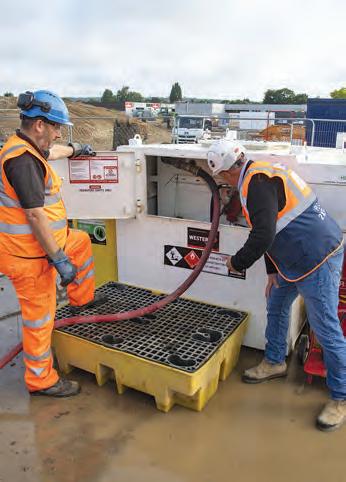
4 minute read
TECHNOLOGY
The Rye Group has switched from using fossil diesel as a fuel, to the near zero emissions hydrocarbon hydro-treated vegetable oil (HVO).
Advertisement
OUT OF THE FRYER INTO THE TANK

Paul Argent reports on an early adopter of hydro-treated vegetable oil (HVO) as a fuel of the future
rom April 2022 the UK
Fconstruction industry will no longer have access to rebated ‘red’ diesel and gas oil, and full-priced ‘white’ diesel will have to be used in all machines. From an environmental perspective, the benefi t will come from a marginal reduction in the overall use of diesel by the industry. This will be driven both by contractors and clients requiring their sites to become more effi cient, leading to the widespread uptake of fuel-saving muck-shifting technologies, on the latest fuel-effi cient machines.
An increasingly important aspect of tender awards is the impact that the producing RME. Compared with bio-diesel, HVO is a technically superior fuel (see panel overleaf), which can be made from a number of waste streams, including used cooking oil.
proposed works will have on the client’s carbon footprint. Over recent years, this has focused on using lower-emissions machines in smarter ways. With the new baseline fuel cost being full-priced diesel, the additional environmental benefi ts of fi lling the tanks with a diesel substitute come well within fi nancial range.
Throughout Europe the production of the fi rst generation of bio-fuels, such as the bio-diesel rapeseed methyl ester (RME), has now reached its peak. They are being replaced by second-generation bio-fuels, in particular hydro-treated vegetable oil (HVO). Manufacturing HVO involves a far more environmentally-friendly process than
EARLY ADOPTER
An early UK adopter of HVO fuel is demolition and remediation main contractor the Rye Group, as MD Simon Barlow declared, “We saw the benefi t early on with HVO, not only to reduce the emissions we are creating as a company, but also to assist our clients in reducing their C02 output on their projects.
“We looked at the benefi ts and pitfalls
HVO IS A HYDROCARBON
First generation crop-based bio-diesels are known as fatty acid methyl esters (FAME), of which rapeseed methyl ester (RME) is the best known. An ester is a chemical compound of organic acid and alcohol. Due to its corrosive nature and other properties, FAME is not used as a fuel by itself, but as a relatively small part in a blend with conventional diesel. The environmental benefit is a marginal reduction in diesel requirements, as a few percent of the fuel comes from a sustainable source.
On the other hand, the chemical compound of hydro-treated vegetable oil (HVO) classifies it as a hydrocarbon, which mimics fossil diesel. It can be used as either a fuel by itself, or as the dominant part of a blend. However, it is a hydrocarbon with a difference, as it is fully biodegradable. In addition, it does not deteriorate and can be used over a far wider temperature range than bio-diesel. More importantly, it does not attract water, nor promote the growth of a variety of fuel bugs.
of using HVO and, despite its slight increase in cost per litre, there is no reason why we shouldn’t switch. Diesel is a commodity that is readily available to us across the country at the moment, HVO isn’t. We deemed it important that we are able to obtain a steady supply at a guaranteed rate per litre for the next few years.”
The Rye Group’s HVO supplier, specifi cally of its Green D+ HVO fuel, is Harlow-based New Era Fuels. The ‘Green D+’ label indicates that the fuel includes a chemical additive that signifi cantly reduces C02 and particulate matter produced in the combustion process, before the exhaust gases pass through the engine’s aftertreatment packs.
With the EN15940 standard now adopted for HVO fuels, machinery manufacturers are jumping on board, as Simon continued, “I’m very pleased that manufacturers have approved the use of HVO fuels. They have come a long way to help with the introduction of Stage V engines and, with the ability to use HVO, we will now have a much greener, less polluting fl eet of equipment.”
THE DEMO SCENE
The Rye Group’s fl eet includes excavators up to 70 tonnes, supported by several HGVs. Much of their work is within the London area, including its various inner-city low emissions zones, often on behalf of environmentally-focused clients, in environmentally-aware communities. In these circumstances, using machinery that, for all practical purposes, produces zero harmful emissions from a sustainable fuel could be a big plus point.
Rye Group’s operations director Ben Griffi ths said, “It is a bold but sensible move to switch our entire fl eet over to HVO, as it meets with our ethos as a company to reduce our carbon footprint wherever we can. We recycle or reuse around 98% of the material we come into contact with, only asbestos goes to landfi ll.”
“Our modern fl eet of plant and transport conforms to the latest emissions regulations and now we are able to use a fuel made up from 100% waste materials. Many of our sites are in built-up areas, so a marked reduction in harmful outputs from our equipment can only be a good thing. It is a great step forward, not only for the Rye Group, but also for the wider construction and demolition industry.”

New Era Fuels also off ers smart site fuel tanks and a telematics system that allows remote monitoring and automatic warnings of low fuel levels.











